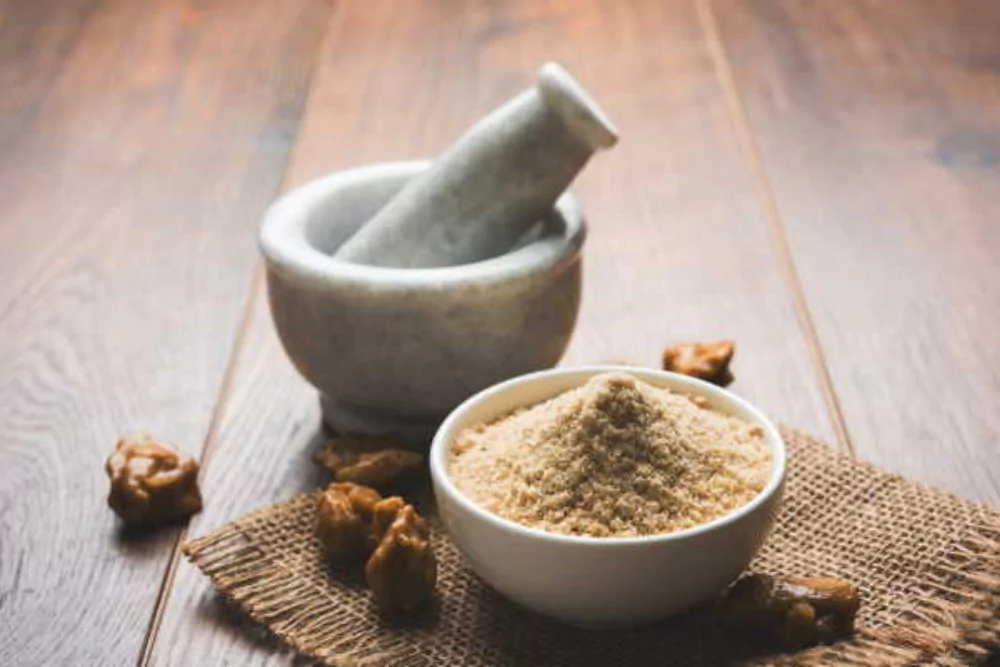1. How does asafoetida help with summer allergies?
Short Answer: Asafoetida has anti-inflammatory and antimicrobial properties that can help reduce allergic reactions and boost respiratory health during summer.
Long Answer:
- Anti-inflammatory Action: Asafoetida contains compounds such as ferulic acid that help soothe inflamed airways, which are often triggered by pollen and dust in summer.
- Boosts Immunity: It stimulates white blood cell activity, helping your immune system respond better to allergens.
- Natural Expectorant: It helps the lungs expel phlegm and mucus, reducing congestion and irritation caused by allergic responses.
- Antimicrobial Properties: Asafoetida inhibits the growth of harmful bacteria and fungi that may aggravate allergy symptoms or cause secondary infections.
- Digestive Aid: Allergies are often linked to gut health. Asafoetida promotes a healthy digestive system, reducing the histamine response in the body.
- Adaptogenic Benefits: Asafoetida helps the body adapt to environmental stressors, which is helpful during pollen-heavy seasons.
- Natural Detoxifier: It helps flush toxins that can trigger immune overreaction and allergic symptoms.
2. Can asafoetida reduce symptoms like sneezing and congestion?
Short Answer: Yes, asafoetida may help ease symptoms such as sneezing, nasal congestion, and mucus buildup associated with summer allergies.
Long Answer:
- Clears Nasal Passages: Asafoetida acts as a natural decongestant, opening nasal channels clogged by pollen and dust.
- Reduces Sneezing: Its active compounds reduce the body’s histamine response to allergens, thereby lessening sneezing frequency.
- Thins Mucus: It helps in thinning mucus secretions, making it easier for the body to expel them.
- Reduces Irritation: Soothed nasal and bronchial passages result in fewer coughs and irritation-related sneezes.
- Relieves Sinus Pressure: Asafoetida can help drain congested sinuses, reducing pressure and pain during allergy episodes.
- Promotes Easy Breathing: By reducing mucus and inflammation, it supports clear and unobstructed breathing.
- Works with Other Herbs: When combined with ginger or turmeric, asafoetida amplifies anti-allergy effects for faster relief.
3. Is it safe for children and people with respiratory conditions?
Short Answer: Asafoetida is generally safe in small amounts for children and people with respiratory conditions but must be used cautiously under supervision.
Long Answer:
- Children: Asafoetida can be introduced in cooked food in very small quantities (less than 100 mg). Avoid raw or topical applications for kids under 5 years.
- Asthmatics: Its anti-inflammatory action may support asthma symptom relief, but only as a supplementary aid—not a primary treatment.
- Chronic Respiratory Conditions: It may help with symptoms like congestion, wheezing, and shallow breathing. Monitor for any adverse effects.
- Allergic Reactions: Some individuals may have sensitivity to asafoetida. Start with a low dose to test tolerance.
- Medical Supervision: Always consult a doctor before including asafoetida in the diet of children or those with respiratory issues.
- Form of Usage: Powdered and cooked asafoetida is safer than raw or concentrated extracts for vulnerable individuals.
- Observe Symptoms: If symptoms like rash, nausea, or breathlessness appear, discontinue use immediately and seek medical attention.
4. How should asafoetida be used for allergy relief—dietary or topical?
Short Answer: Asafoetida is best used as a dietary supplement for allergy relief, though mild topical use may help in some cases.
Long Answer:
- Dietary Use: Add a pinch of asafoetida to warm meals, particularly in lentils, soups, and vegetable dishes to enhance digestion and immune response.
- Asafoetida Tea: Make herbal tea by boiling 1 cup water with 1 pinch asafoetida, 1 tsp ginger, and 3 tulsi leaves. Drink once daily during allergy season.
- Topical Paste: A mixture of asafoetida and coconut oil can be applied to the chest to relieve congestion, but only for adults and after a patch test.
- Steam Inhalation: Add a pinch of asafoetida to boiling water and inhale the steam to clear nasal passages naturally.
- Capsule Form: Asafoetida supplements are available, but should only be taken after consulting a healthcare provider.
- Combination Remedies: Use it with turmeric, black pepper, or honey for synergistic anti-allergy benefits.
- Storage & Use: Store in an airtight container and use within 6 months for best potency and effect.
5. Are there any side effects or precautions to consider when using asafoetida for allergies?
Short Answer: Yes, overuse of asafoetida can cause side effects like bloating, headaches, and skin irritation. Always use in moderation.
Long Answer:
- Gastrointestinal Issues: High doses can lead to stomach upset, flatulence, or even diarrhea in sensitive individuals.
- Skin Reactions: Undiluted topical application may cause redness or itching. Always mix with a carrier substance.
- Pregnancy Warning: Asafoetida may stimulate uterine muscles, so it’s best avoided during pregnancy and breastfeeding unless advised by a doctor.
- Medication Interactions: It may interact negatively with blood thinners and antihypertensive medications.
- Safe Dosage: Do not exceed 500 mg per day for adults unless under medical supervision.
- Not for Infants: Asafoetida is not suitable for babies below 2 years due to their sensitive digestion and skin.
- Allergic Response: In rare cases, asafoetida itself may trigger mild allergic symptoms. Stop use if such signs appear.
Recommended Safe Dosage Table
| Group | Recommended Daily Intake | Form of Use |
|---|---|---|
| Adults | 250–500 mg | Dietary, Tea, Steam |
| Children (above 5 years) | 50–100 mg | In Food Only |
| Pregnant Women | Not Recommended | — |
| People with Medical Conditions | Consult a Physician | Controlled Use |
Conclusion
Asafoetida is a powerful traditional spice known for its multiple health benefits, including the ability to support the respiratory system and reduce allergy symptoms. For those suffering from summer allergies, incorporating asafoetida in the diet could offer natural relief from symptoms like sneezing, nasal congestion, and sinus pressure. However, like any herbal remedy, it should be used responsibly. Vulnerable groups like children, pregnant women, and people with chronic illnesses should consult a healthcare provider first. Whether consumed as part of a dish, a herbal tea, or as an ingredient in home remedies, asafoetida can be a beneficial part of your seasonal wellness toolkit when used properly.





